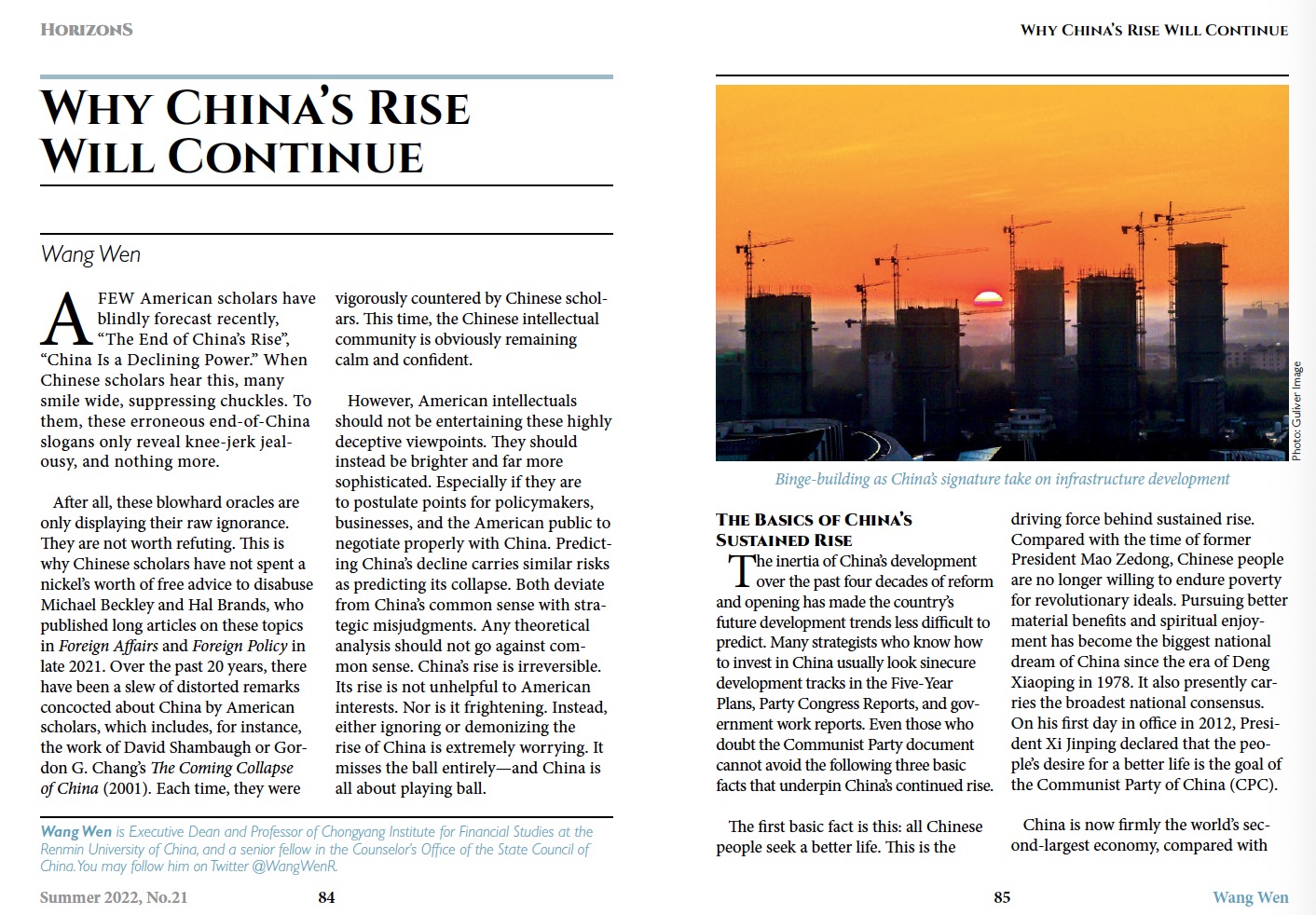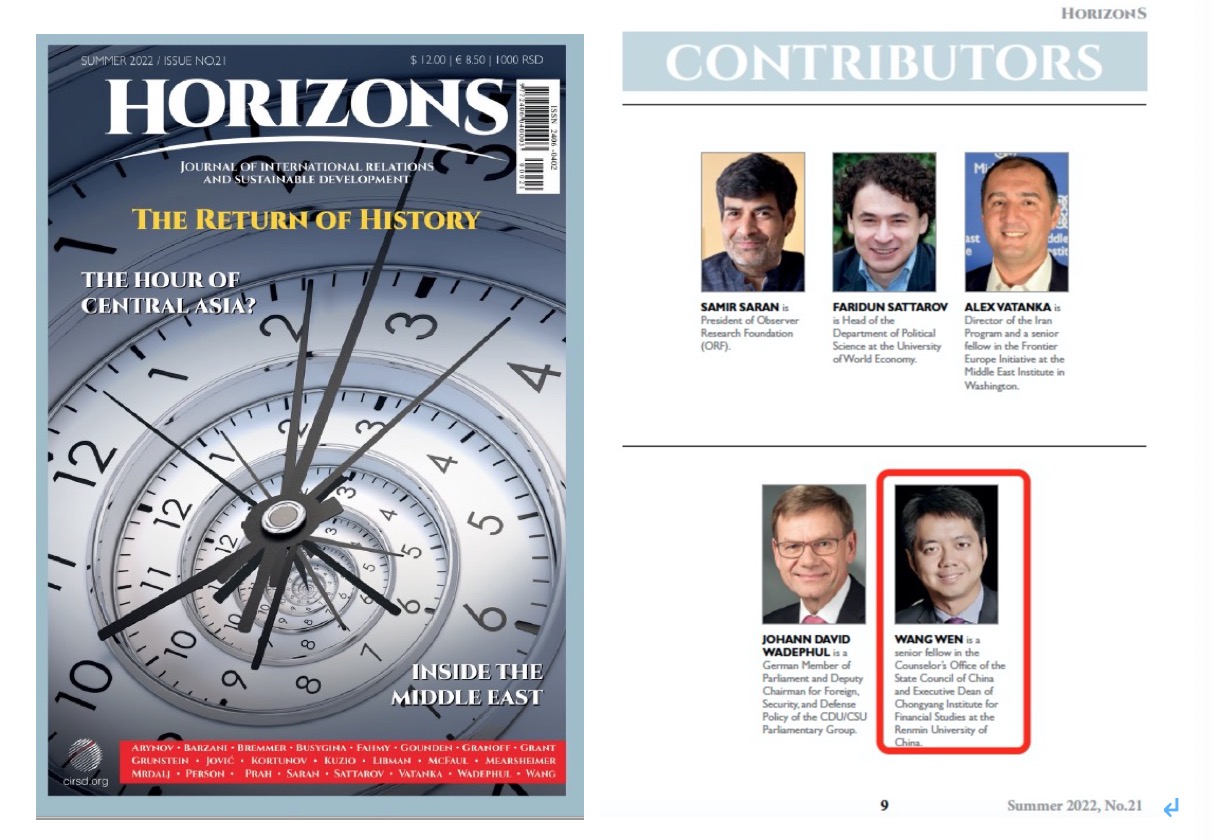LATEST INSIGHTS
Your Present Location: LATEST INSIGHTSEuropean journal Horizons' article: Why China’s Rise Will Continue
European journal Horizons' article:
Why China’s Rise Will Continue

The summer 2022 issue of one leading European journal Horizons published a 14-page paper written by Wang Wen, Executive dean of Chongyang Institute for Finance Studies at Renmin University of China (RDCY), entitled Why China’s Rise Will Continue, refuting the recent "The End of China's Rise" and "China Is a Declining Power" arguments in American academia, which has attracted widespread attention from the international academic community.

Horizons is a major English-language publication of the Center for International Relations and Sustainable Development (CIRSD) that focuses on global public policy discussions. The summer issue of 2022 was devoted to the theme of "The Return of History", with the participation of seventeen internationally renowned experts and scholars, including Ian Bremmer, President of Eurasia Group; John J. Mearsheimer, Professor of the University of Chicago; Michael McFaul, former U.S. Ambassador to Russia; Andrey Kortunov, Director-General of the Russian International Affairs Council; Samir Saran, President of Observer Research Foundation (ORF); and Wang Wen, Executive Dean of RDCY, presented their views to discuss in depth the current changes in the international system and international order, geopolitical changes, and the impact on the future course of history.
In his paper, Wang explained "Why China’s Rise Will Continue" in four parts. The article argues that the so-called "China's rise to the top" defies the basic common sense of China's continued rise, namely that all Chinese people seek a better life. This is the driving force behind sustained rise. The second is the continuity of Chinese policy. Third, China's current ability to defend itself against foreign invasion. No outside force would dare to interrupt China's rise.
The second part of the article describes five misunderstandings that some international public opinion has about China's development, which are to regard decline in China’s GDP growth rate as an economic recession, to regard the bankruptcy of some large private enterprises in China as market economy stagnation, to regard the centralized power as a “state dictatorship”, to regard the complaints made by certain members of China’s elite as a sign of backsliding, to regard patrols of Taiwan as the harbingers of imminent invasion.
The article also tells that for many years, China's development has not been led by the nose by the United States, and discusses what the future of the U.S.-China competition should really be for. The article suggests that China and the United States should first compete to solve global development dilemma lies in this question: which country can offer more effective solutions to world development? More importantly, which country can best manage the convenience of life, the well-being of its people, social stability, and economic recovery? Second, China and the United States should compete to deal with global climate change. Climate change has reached a critical moment. More and more climate scientists believe that if the global mean temperature continues to rise without taking substantive and effective measures, the twenty-first century could be the last complete century of human civilization.The climate crisis will also be accompanied by other sharp crises: energy, financial, and social. These will be of much greater magnitude than the suffering caused by the COVID-19 pandemic. Third, China and the United States should compete to promote global technological innovation. Developing intelligent technology is like opening “Pandora’s box.” Will human beings become stronger or weaker in the face of artificial intelligence technology? Towards new prosperity, or extinction? These will be the ultimate tests of humanity’s thinking.
Finally the article argues that if the two countries have to compete, the author hopes it will not be a boxing match but more like golf. Whoever wins will need to support global civilization, and development of the world. From this point of view, the real test of the two countries’ competitive civilization has just begun. At this new starting point, talking about the end of China’s rise is incredibly shortsighted—if not altogether blind.
This is another important article published by Executive Dean Wang Wen in important international newspapers in 2022. Previously, Wang published an article Why Do Many Chinese Sympathize With Russia in the Ukraine Conflict? in Diplomat in March, US is so bent on resisting China’s rise, it has ignored its own decline in South China Morning Post in June, Why China's People No Longer Look Up to America in The New York Times in August, and also accepted interviews with BBC, The Washington Post, RT and other international media, all of which attracted widespread attention and reactions at home and abroad.























































































 京公网安备 11010802037854号
京公网安备 11010802037854号





